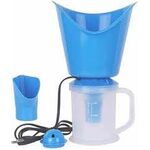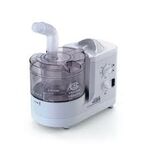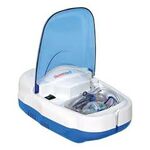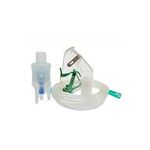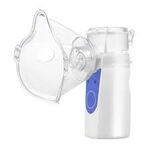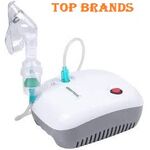Nebulizer Machine
What is a Nebulizer Machine?
A nebulizer machine is a small medical device that enables respiratory relief. It works by using air (from a compressor or ultrasonic vibration) to break up the medication into tiny particles that can be easily inhaled.
Uses of a Nebulizer Machine:
A nebulizer machine is used to convert liquid medications into a fine mist, enabling direct inhalation into the lungs. It is particularly beneficial for individuals with respiratory conditions, offering precise and efficient delivery of therapeutic agents.
1. Treatment of Asthma
Nebulizers are frequently prescribed for individuals with asthma, particularly during acute episodes. They deliver bronchodilators that help open the airways, relieve wheezing, and restore normal breathing with minimal delay.
2. Management of Chronic Obstructive Pulmonary Disease (COPD)
In patients with COPD, including chronic bronchitis and emphysema, nebulizers are used to administer long-acting bronchodilators and steroids, helping to reduce inflammation and improve airflow over time.
3. Relief During Acute Respiratory Infections
During respiratory infections such as bronchitis or pneumonia, nebulizers can be used to deliver antibiotics, mucolytics, or anti-inflammatory medications directly into the lungs for targeted relief.
4. Support for Cystic Fibrosis Patients
Individuals with cystic fibrosis benefit from nebulized saline or enzyme-based solutions that thin mucus, making it easier to clear the lungs and prevent infection.
5. Respiratory Support for Children and the Elderly
Children who have difficulty using inhalers and elderly patients with compromised lung function often find nebulizers easier and more comfortable to use, especially during illness or emergencies.
Parts of Nebulizer Machine:
- Compressor Unit (Main Machine)
- The power source that creates airflow to convert medicine into mist.
- Usually has an on/off switch, power cord, and air outlet.
- Common brands like Omron or Philips use piston-driven compressors.
- Air Tubing (Connecting Hose)
- A flexible tube that connects the compressor to the medicine cup.
- Carries compressed air to help turn medicine into an aerosol.
- Must be cleaned or replaced periodically to prevent blockages.
- Nebulizer Cup / Medication Chamber
- Small container where you pour the liquid medication.
- The mist is generated here when air passes through it.
- Often made of clear plastic and comes with volume markings.
- Mouthpiece or Mask
- The part that delivers the mist to your mouth or nose.
- Mouthpiece is preferred for adults for better drug delivery.
- Masks (adult/child sizes) are ideal for kids or those who can’t hold a mouthpiece.
- Baffle or Mesh Disc (Inside the Nebulizer Cup)
- A tiny component that helps break the medication into a fine mist.
- Often overlooked, but critical for effective aerosolization.
- Filter (Air Inlet Filter)
- Found in or near the compressor unit to clean incoming air.
- Must be replaced regularly to keep air pure and avoid contamination.
- Power Supply (Cord or Battery)
- Desktop nebulizers use a plug-in power cord.
- Portable models may have rechargeable batteries or USB power options.
How Does Nebulizer Machine Work?
1. A nebulizer turns liquid medicine into a fine mist.
2. You breathe in the mist through a mask or mouthpiece.
3. Just sit comfortably, wear the mask, and breathe normally.
4. The machine uses air pressure to break the medicine into tiny droplets.
5. These droplets reach deep into your lungs where the medicine is needed.
6. It works quickly and gently, with no special effort from you.
7. Especially helpful during asthma attacks, wheezing, or breathing issues.
8. Ideal for children, elderly people, or anyone who struggles with inhalers.
9. Simple, quiet, and easy to use—just breathe in and let it work.
Understand Nebulizer Machine Price:
This is the most common question doctors ask from our team when exploring our nebulizer machines is, ‘What is the price of nebulizer machines.
And we reply in a simple manner, the price varies depending on the models and brands. In India, The starting price of a hospital grade nebulizer machine starts from ₹1,000, and it goes up to ₹50,000
Benefits of Portable Nebulizer Machine:
Benefit | Description |
Direct Medication Delivery | Efficiently delivers medication to the lungs for rapid relief |
Proven Pediatric Safety | Clinically validated for safe use in children |
Advanced Technology | Utilizes mesh technology for optimal particle size and minimal residue |
Portability | Compact and lightweight design for easy transport |
User-Friendly | Simple operation suitable for all age groups |
Quiet Operation | Low noise levels for discreet use |
Medication Versatility | Compatible with various respiratory medications |
Different Types of Nebulizer Machine:
Here are various types of nebulizer available, you can buy it according your requirements.
It uses compressed air to create a mist. It is a most common type, and very affordable as compared to other type.
The compressor nebulizer price starts from ₹800 in India, but can be noisy and bulky.
A mesh nebulizer uses a fine mesh to create an aerosol. They are more advanced and produce a low noise.
The staring price of jet nebulizers is ₹2,000.
This type of nebulizer uses high-frequency vibrations to turn medicine into a mist. They are available in large and small volumes for different uses.
If you want to buy an ultrasonic nebulizer machine, it will cost you around ₹5,000 to ₹40,000.
Nebulizer machine price according to types:
Nebulizer Type | Min. Price | Max. Price |
compressed nebulizer | ₹800 | ₹13,000 |
mesh nebulizer | ₹2000 | ₹5,000 |
ultrasonic nebulizer | ₹5000 | ₹50,000 |
Top 5 Models of Nebulizer Machine:
Buy The Best Nebulizers Online From Biomed Suppliers.
Biomed suppliers has excellent sourcing for various types of nebulizers for adults. We offer a large selection of portable nebulizer on one platform. Our simple search and ordering and swift turnaround time guarantee a smooth and flawless process. Biomed suppliers offers you the best nebulizer machines from the most well-known brands in India. We provide the widest selection of the best nebulizer products from brands like Omron, Philips, Yuwell and others.
Purchase a Nebulizer Machine from the Best Brands:
Omron Nebulizer Machine: Known for advanced features like low noise, continuous flow, portable options, and premium displays.
Medtech Nebulizer Machine: Offers affordable and decent performance nebulizers.
Philips Nebulizer Machine: Provides high-quality nebulizers with advanced features.
Dr Trust Nebulizer Machine: Features include portability, child-friendly design, and low noise.
BPL Nebulizer Machine: Balances cost and quality, with prices ranging from ₹1,000 to ₹5,000.
Best Nebulizer Machine Brands | Min. Price | Max. Price |
Omron | ₹1,200 | ₹50,000 |
Medtech | ₹11,00 | ₹3,000 |
Philips | ₹13,00 | ₹3,000 |
Dr Trust | ₹2,000 | ₹6,000 |
BPL | ₹1,000 | ₹5,000 |
Maintaince Tips for Nebulizer Machine?
1. Clean the Nebulizer After Every Use
- Why: Cleaning prevents the buildup of bacteria, mold, or drug residue that can clog the device and affect its performance.
- How: Wash the nebulizer cup, mouthpiece, or mask in warm, soapy water after each use. Let it air dry thoroughly.
- Tip: Avoid using harsh chemicals or abrasive sponges. Use mild dish soap and warm water to avoid damaging the parts.
2. Disinfect Weekly
- Why: Weekly disinfection helps kill any germs or bacteria that may remain after cleaning.
- How: Soak the nebulizer parts (cup, mask, mouthpiece) in a solution of white vinegar and water (1:1 ratio) or use a medical-grade disinfectant. Leave it for about 30 minutes.
- Tip: Rinse thoroughly with clean water before using it again to remove any vinegar or disinfectant residue.
3. Clean the Air Tubing Regularly
- Why: Over time, the air tubing can gather dust, moisture, and medicine particles, which can block airflow and reduce nebulizer performance.
- How: Run warm, soapy water through the air tubing and then rinse it thoroughly. Hang it to dry completely, ensuring no moisture is left inside.
- Tip: Clean the tubing once a week or if you notice it’s dirty or clogged.
4. Replace Filters Periodically
- Why: The air filter prevents dust and particles from entering the machine, but it can get clogged over time, reducing performance.
- How: Check the filter in the compressor unit every 1-3 months, depending on usage. Replace it if it looks dirty, discolored, or worn out.
- Tip: Follow the manufacturer’s guidelines for when and how often to change the filter. Some models may need more frequent replacement if used regularly.
5. Keep the Nebulizer in a Clean, Dry Place
- Why: Storing the nebulizer in a dusty or humid environment can cause damage or affect its functionality.
- How: After cleaning and drying the parts, store your nebulizer in a clean, dry place away from direct sunlight and humidity.
- Tip: Consider using a storage case to protect it from dust and physical damage when not in use.
Frequently Asked Questions (FAQs) About Nebulizer Machines:
What is a nebulizer machine and how does it work?
A nebulizer is a medical device that converts liquid medication into a fine mist or aerosol. This mist is then inhaled directly into the lungs. It works by using air (from a compressor or ultrasonic vibration) to break up the medication into tiny particles that can be easily inhaled.
What is the average price of a nebulizer machine in India?
Most standard nebulizer machines in India range from ₹1,000 to ₹4,500, depending on the brand and features. Premium or portable models can go up to ₹7,000 or more.
When should I use a nebulizer machine?
- Asthma: During an asthma attack or as part of daily maintenance.
- COPD: To manage symptoms like shortness of breath and wheezing.
- Bronchitis: Helps clear mucus and relieve congestion.
- Cystic Fibrosis: Used for airway clearance and to administer antibiotics or bronchodilators.
Can nebulizers be used by children and elderly people?
Yes, nebulizers are safe and effective for children, elderly people, and those with difficulty using inhalers. For children, a mask is usually recommended, and for adults, a mouthpiece is more effective for drug delivery.
How often should I clean my nebulizer machine?
The nebulizer cup and mask should be cleaned after every use to prevent bacterial growth and clogs. The air tubing should be cleaned once a week. Regular cleaning keeps the nebulizer in optimal working condition and ensures medication is delivered properly.
How long does a nebulizer treatment take?
Treatments typically take about 10 to 15 minutes, depending on the type of medication and the model of nebulizer. The process should be finished when the mist no longer comes out of the mouthpiece or mask.
Popular Categories:
Inhaler Machine | Ultrasonic Nebulizer Machine | Mesh Nebulizer Machine | Compressor Nebulizer Machine | Nebulizer Kit | Omron Nebulizer | Dr Morepen Nebulizer | Dr Trust Nebulizer| ECG Machine | Single Channel ECG Machine | 3 Channel ECG Machine | 6 Channel ECG Machine | 12 Channel ECG Machine | Ventilator Machine | ICU Ventilator | Oxygen Concentrator Machine | Portable Oxygen Concentrator | Home Oxygen Concentrator | Dialysis Machine | DVT Pump | Defibrillator | AED Machine | Cardiac Monitor | Multipara Monitor | Pulse Oximeter | Patient Monitor | Fetal Monitor | BiPAP & CPAP Machine | Suction Machine | OT Table | C Arm Machine | Laryngoscope | Anaesthesia Machine | Patient Warmer | Autoclave Machine | X Ray Machine | CR & DR System | Ultrasound Machine | MRI Machine | CT Scan Machine | Littmann Stethoscope | TMT Machine | Holter Monitor | Spirometer Machine | Audiometer | EMG Machine | EEG Machine | Stretcher | Hospital Chair | Hospital Beds | Hospital Trolley | Biochemistry Analyzer | CBC Machine | Centrifuge Machine | Urine Analyzer | Lab Shakers and Rotators | ESR Analyzer | Surgical Microscope | ECG Paper | Insulin Pump | Syringe Pump | Feeding Pump | Oximeter | Stethoscope |

